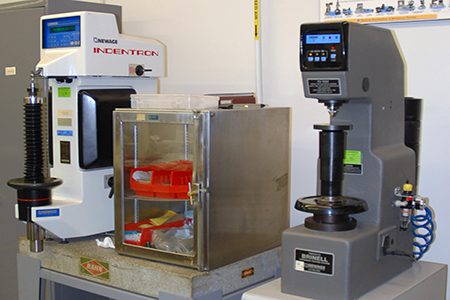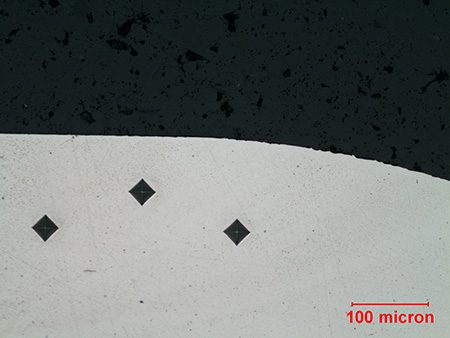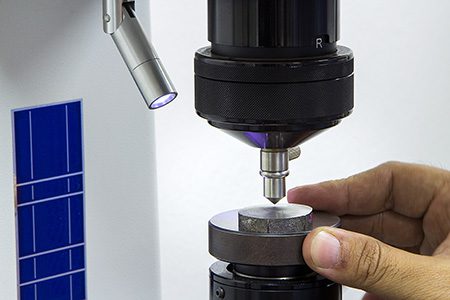Metal Hardness Tests
Hardness testing is a basic mechanical test used to verify that metallic raw materials meet specifications, or it can be used as a quick check for materials that aren't performing as expected. The determination of whether a material is suitable for a given application or to the particular treatment to which it will be subjected is a key component of product development.
Rockwell Hardness Test
Rockwell hardness tests quantify the resistance of a material to plastic deformation, measure the indentation area, and are available as micro-indentation or macro-indentation.
Rockwell Hardness Tests (A, B, C, F, L, 15N, 30N, 45N, 15T, 30T, 45T, E, 15Y)
Brinell Hardness Test
Similar to the Rockwell hardness test, a Brinell hardness test uses a heavier test metal and creates a larger indentation in the sample material, and measures only the indentation.
Brinell Hardness (500, 1000, 1500, 3000Kgf)
Additional Hardness Tests
Microhardness:
- Macro Vickers - additional factor of relationship to distance is measured
- Macro-Vickers Microhardness (1-10kg)
- Vickers - measures largest scale of all hardness tests
- Vickers Microhardness (10-1000gf)
- Knoop - for fragile materials, less indentation to the sample material
- Knoop Microhardness (10-1000gf)
Non-Metallic Hardness Tests
- Macro Vickers - additional factor of relationship to distance is measured
- Macro-Vickers Microhardness (1-10kg)
- Vickers - measures largest scale of all hardness tests
- Vickers Microhardness (10-1000gf)
- Knoop - for fragile materials, less indentation to the sample material
- Knoop Microhardness (10-1000gf)



MECHANICAL TESTING METHODS
Abrasion (Taber)
Adhesion (Peel) Testing
Bend Testing
Bond Strength Testing
Charpy Impact Testing (-320°F to 450°F)
Climbing Drum Adhesion of Sandwich Composites
Coating Adhesion
Coating Shear Fatigue
Coefficient of Thermal Expansion by TMA
Composite Testing (Fiber Reinforced)
Compression Set
Compressive Properties
Core Shear Properties of Sandwich Construction by Beam Flexure
Creep and Stress Rupture Testing
DMA (Dynamic Mechanical Analyzer)
Ductility
Elastic Modulus
Fatigue Testing
Filled Hole Tension & Compression
Flattening
Flat-wise Tensile Testing
Flexural Properties
Floating Roller Peel Strength
Fracture Mechanics
Gel Time
Hardness (Rockwell, Brinell, Durometer, Shore, Barcol, Knoop, Vickers, Macro Vickers)
Heat Aging
Heat Deflection by TMA
Heat Treatment (furnace to 2100°F)
Hydrogen Embrittlement
Hydrostatic Pressure
Indentation Toughness
Interlaminar Shear
Jominy Hardenability
Lap Shear Testing
Machining & Specimen Preparation
Materialography
Modulus of Rupture (MOR)
n-Value (Strain Hardening Exponent)
Open Hole Tension and Compression
Pipeline Integrity Testing
r-Value (Plastic Strain Ratio)
Residual Strength of Composites After Impact
Rotating Beam Fatigue
Shear Testing of Rivets to ASTM B565, Single/Double
Short Beam Strength
Shot Peen Qualification
Single-Edged Notched beams (SENB)
Slow Strain Rate (G129)
Specimen Conditioning
Strain Gaging
Surface Roughness (ANSI/ASME B46.1)
T Peel Strength
Tear Resistance of Films & Sheeting
Tear - Rubbers & Elastomers
Tensile Testing
Torsional and Axial Fatigue (200 lb)
Tube Testing (Tensile, Flare, Hydrostatic)
Welder & Procedure Qualification
Wire/Spring Testing (Wrap, Coil, Bend)
Young's, Tangent and Chord Modulus (Room Temperature)
RELATED HARDNESS TESTING SPECIFICATIONS
ASTM A370
ASTM B578
ASTM D2240
ASTM D2583
ASTM E10
ASTM E18
ASTM E384
ASTM F606 / F606M
ISO 868
SAE J429
SAE J995
...and more
INDUSTRIES SERVED BY METAL HARDNESS TESTING
- Aerospace
- Automotive
- Energy
- Manufacturing
- Medical
- Metal Foundries
- Nuclear Power
- Petroleum
RELEVANT ACCREDITATIONS
Click here for a complete list of accreditations and certifications for all IMR Test Labs locations.


